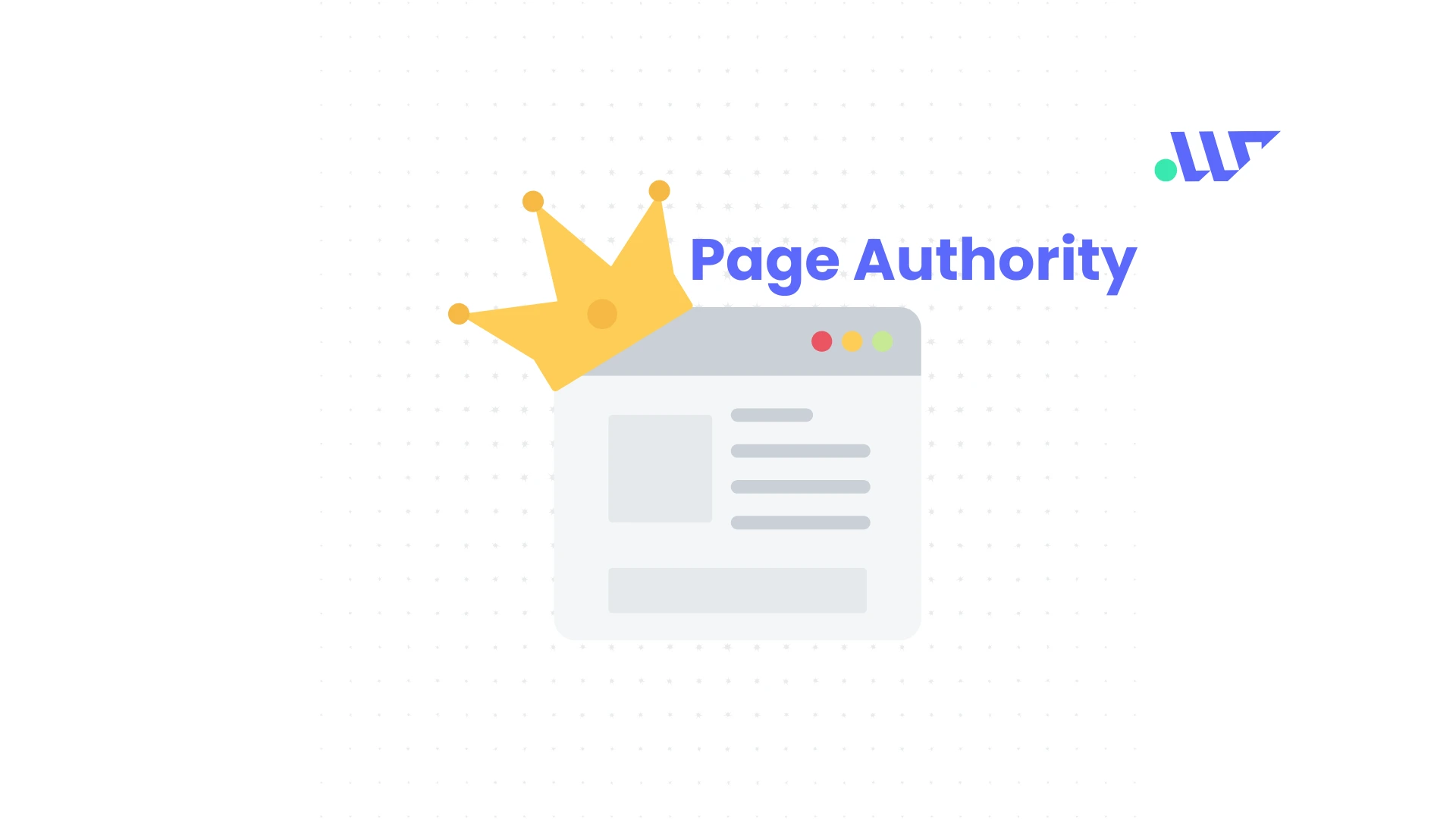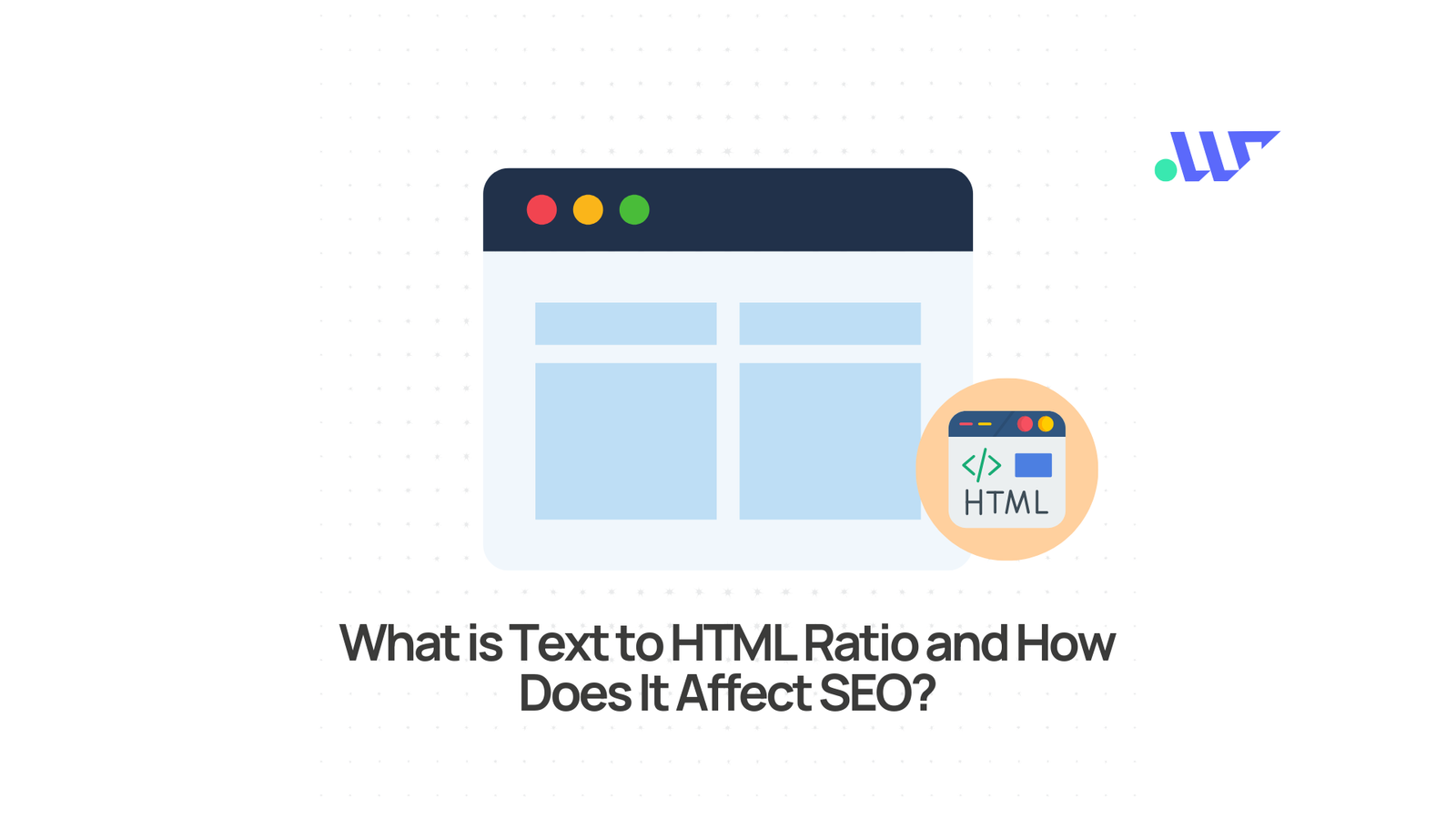Page Authority (PA) is a metric developed by Moz that predicts how well a specific page on your website will rank on search engine result pages (SERPs).
Table of Contents
What is Page Authority?
Page Authority is a ranking metric developed by Moz that evaluates the potential of a single page to rank on search engines like Google. Unlike Domain Authority, which looks at the credibility of the entire website, Page Authority focuses on a specific page’s strength.
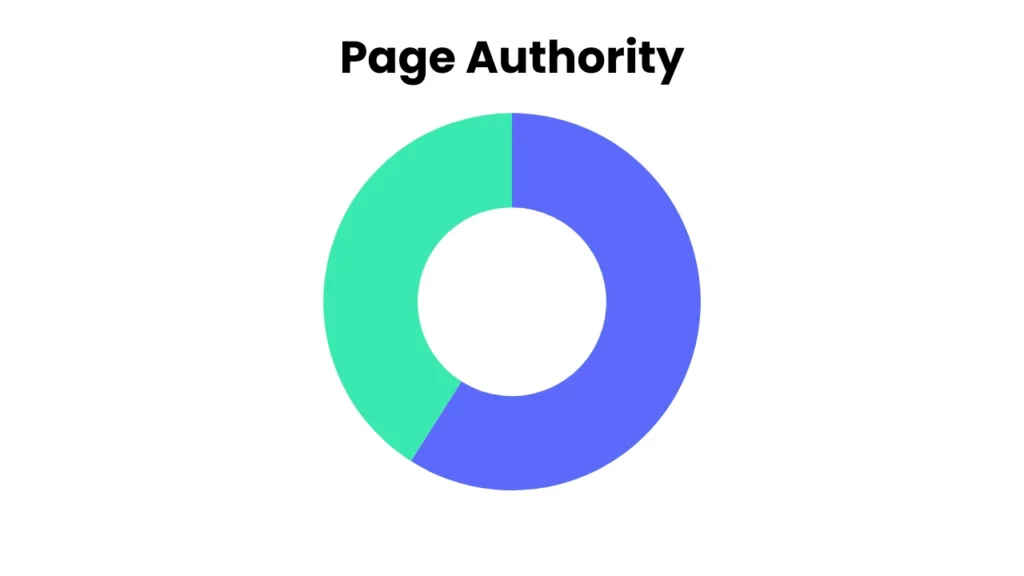
Let’s say we have a service page for website design. PA will look at the authority of that Particular Page based on number links, relevance of the content, etc.
This score ranges from 1 to 100, with higher scores indicating better ranking potential. A page with a PA of 60 will likely outrank a similar page with a PA of 30 for the same keyword. The metric uses various factors like backlinks, the quality of inbound links, and the relevance of the content to generate the score. However, it’s important to note that Page Authority doesn’t factor in on-page elements like keywords or meta descriptions.
How is Page Authority Scored?
Page Authority is calculated on a logarithmic scale, which means it’s much easier to go from a score of 20 to 30 than from 70 to 80. This ensures that higher scores truly reflect exceptional performance.
Several factors influence the Page Authority score, including:
- Backlinks: The quantity and quality of links pointing to a page. Pages with links from reputable websites score higher.
- Domain Strength: A page’s PA is often influenced by the Domain Authority (DA) of the website it belongs to.
- Spam Signals: Pages with spammy or low-quality links may see their PA drop over time.
- Age of the Page: Older pages tend to have more backlinks and trustworthiness.
Quick Tip: Use tools like Moz’s Link Explorer to check your PA and analyze which factors might be helping or hurting your score.
Access the FREE Moz Link Explorer
Why is Page Authority Important for SEO?
Imagine you’re competing in a race, and Page Authority is your head start. Higher PA scores give your page a better chance of ranking higher on search engine result pages (SERPs). Since 75% of users never scroll past the first page of search results, improving your PA can directly impact how much traffic your website gets.
Here’s why it matters:
- Visibility: Pages with higher PA scores are more likely to appear on the first page for relevant keywords.
- Link Attractiveness: High-PA pages naturally attract backlinks, as people prefer linking to trusted sources.
- Competitor Analysis: By comparing your PA to that of your competitors, you can create a roadmap to outperform them.
For example, if your competitor’s product page has a PA of 55 and yours is at 40, you know you’ll need to focus on strategies like building better backlinks, matching the user intent and optimizing your content to close the gap.
What is a Good Page Authority Score?
There’s no one-size-fits-all answer because what’s considered a “good” Page Authority depends on your industry and competition. However, as a general guide:
- 30-50: Average for smaller websites or new pages.
- 50-70: Good authority, often seen in established businesses.
- 70+: Excellent, usually reserved for industry leaders and high-traffic pages.
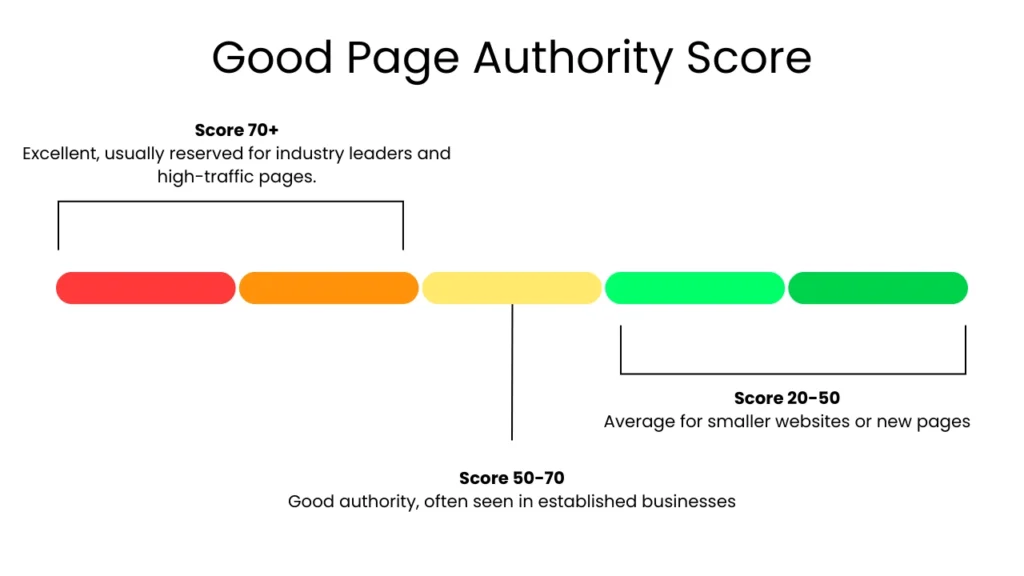
Instead of aiming for a specific score, focus on improving your PA relative to competitors in your niche. If the average PA of similar pages in your industry is 45, achieving a PA of 50 puts you ahead.
Fun Fact: Data from Moz shows that most pages fall between 20 and 40 PA. Breaking into the 50+ range requires consistent effort, including quality link-building and content updates.
Pro Tip: Use Moz’s free PA checker to track your progress and compare scores across your pages and competitors.
How to Check Your Page Authority Score
Knowing your Page Authority score is crucial if you want to improve your page’s performance on search engines. The good news? Checking your score is super easy with the right tools.
The best tool to start with is Moz’s Link Explorer. Simply enter the URL of your specific page, and the tool will display your Page Authority score, along with other useful metrics like the number of backlinks and Spam Score. For a deeper analysis, tools like Semrush also offer Authority Score features, giving insights into your page’s strengths and weaknesses.
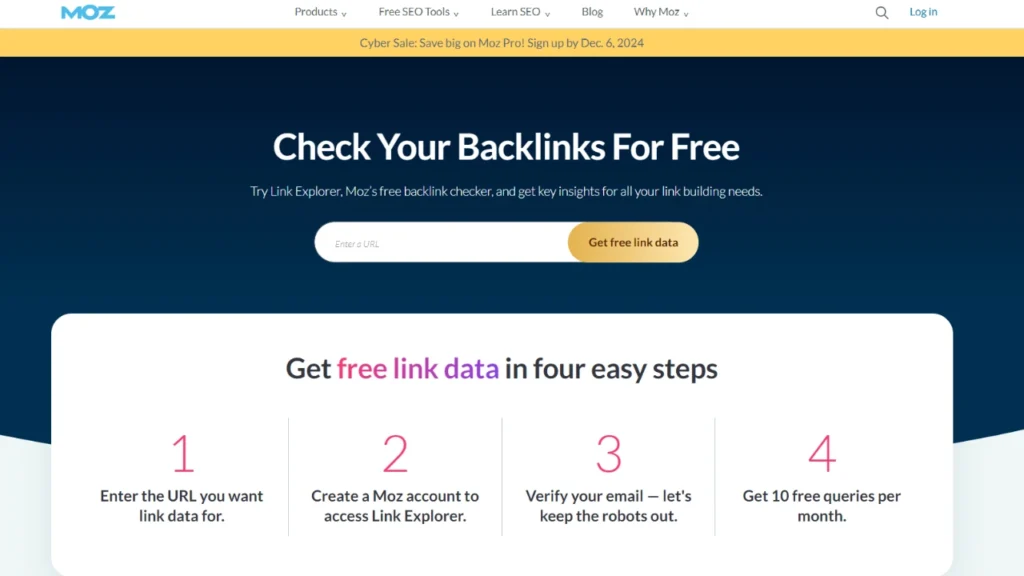
Step-by-Step to Check Page Authority:
- Visit Moz’s Link Explorer.
- Enter your web page URL.
- Click “Analyze.”
- Review your Page Authority score, backlinks, and domain metrics.
Quick Tip: Regularly track your PA to monitor your SEO efforts. If your score is going up, you’re on the right path. If it’s dropping, it’s time to reassess your SEO strategies.
Fun Fact: According to Moz, the average PA for most web pages hovers between 20 and 40. Don’t be discouraged if your score starts low—it’s all about consistent improvement!
How to Improve Page Authority
Improving your Page Authority doesn’t happen overnight, but the right strategies can move the needle in your favor. Here are the top ways to boost your score and make your page a ranking powerhouse.
Important: Please don’t use Cheap gigs offered on Places like Fiverr, Upwork and other freelancing sites that promise you to increase your PA.
1. Publish High-Quality Content
Content is king! Search engines and users love pages with unique, informative, and engaging content. Write for your audience first, but don’t forget to optimize your content for SEO. Include target keywords naturally, use headings effectively, and always aim to provide value.
Pro Tip: Longer, in-depth articles (1,500+ words) tend to perform better on search engines. According to HubSpot, blogs with 2,500+ words generate the most backlinks, which directly impact Page Authority.
2. Build High-Quality Backlinks
Not all links are created equal. Focus on earning backlinks from authoritative websites within your industry. For example, a link from a major news outlet or a well-known blog can significantly boost your PA.
Moreover, getting a backlink from a website that is in the same niche is more helpful than getting links from random sites.
Actionable Idea: Create linkable assets like infographics, research studies, or how-to guides. These types of content naturally attract backlinks because they’re highly shareable and useful.
You can also use HARO (help a reporter out) where you get backlinks by answering questions from Reporters.
3. Update Older Content
If your page hasn’t been updated in years, it might be time for a refresh. Add new statistics, rewrite outdated sections, and optimize for new keywords. Fresh content signals relevance to search engines and can help improve your Page Authority score.
4. Use Internal Linking
Internal links help search engines understand the structure of your website and pass authority between your pages. Link your high-performing pages to newer or lower-PA pages to give them a boost.
5. Avoid Black Hat SEO Techniques
Steer clear of shady tactics like buying links, keyword stuffing, or cloaking. While these may offer short-term gains, they can harm your PA in the long run and even lead to penalties from search engines.
Why Does Page Authority Change?
It’s common for Page Authority scores to fluctuate over time. These changes are often caused by external factors, such as search engine algorithm updates or your competitors’ actions.
Here are some reasons why your PA might go up or down:
- New Backlinks: Gaining or losing links from high-authority websites can impact your PA score.
- Spam Signals: If your page accumulates spammy links, its PA may drop.
- Increased Competition: When competitors improve their own SEO strategies, they might outrank your page, leading to a relative decrease in your PA.
- Content Freshness: Pages that haven’t been updated for a while can lose relevance and authority.
Fun Fact: According to Moz, PA scores are recalculated regularly to reflect the latest web data. This means you’ll always have an up-to-date view of your page’s performance.
Page Authority vs Domain Authority: Key Differences
Both Page Authority and Domain Authority are important metrics, but they measure different aspects of a website’s ranking potential.
| Metric | Page Authority (PA) | Domain Authority (DA) |
| Focus | Single web page | Entire domain or subdomain |
| Key Influences | Backlinks to the page, page relevance | Overall link profile, domain-wide authority |
| Best For | Comparing individual pages | Evaluating a website’s overall performance |
Key Takeaway: Use both metrics together for a well-rounded SEO strategy. For example, improve PA for individual pages while working on DA to enhance your site’s overall credibility.
Page Authority FAQs
What is Page Authority in SEO?
Page Authority is a metric developed by Moz to predict how well a specific page will rank on search engine result pages (SERPs). It’s scored on a scale from 1 to 100, with higher scores indicating better ranking potential. PA is based on factors like backlinks, domain strength, and spam signals, but it doesn’t consider on-page elements like keywords.
How does Page Authority affect rankings?
While Page Authority itself is not a ranking factor used by Google, it correlates with key SEO factors that influence rankings, such as the quality and quantity of backlinks. Pages with higher PA tend to perform better on SERPs because they often have stronger link profiles and authority.
What’s the difference between Page Authority and Domain Authority?
Page Authority focuses on the ranking strength of an individual page, while Domain Authority evaluates the overall credibility of a website or subdomain. Both metrics are useful but serve different purposes in SEO strategies.
How often does Page Authority update?
Page Authority scores are updated regularly by Moz to reflect the latest changes in link profiles, spam signals, and other factors. Keep checking your score periodically to monitor your progress and adapt your SEO efforts.
How do I improve my Page Authority score?
To improve your PA, focus on building high-quality backlinks, creating valuable content, updating older pages, and avoiding spammy practices. Tools like Moz’s Link Explorer can help you identify opportunities for growth.
Can I have a high Domain Authority and low Page Authority?
Yes, it’s possible! Even if your domain has high authority, individual pages may have low PA if they lack backlinks, relevant content, or internal links. Prioritize building authority for important pages to balance your site’s overall performance.
Final Words: Why Page Authority Matters
Page Authority is a powerful tool for anyone looking to boost their website’s visibility. By focusing on the ranking potential of individual pages, PA gives you a clear roadmap for improving your site’s SEO performance. While it’s not a direct Google ranking factor, the elements that contribute to a strong PA—like backlinks and content quality—are essential for search engine success.
Think of Page Authority as a guide. It helps you measure the effectiveness of your strategies, spot opportunities for improvement, and even benchmark your progress against competitors. Whether you’re running a personal blog, an online store, or a corporate website, understanding and improving PA can make a significant difference in your search rankings.
Pro Tip: SEO is a marathon, not a sprint. Improving your Page Authority takes time and consistent effort, but the results are worth it! Keep creating great content, building quality links, and staying on top of SEO best practices.
